Exploring Alternative Automotive Multi Pin Connectors: Innovations in Connector Technology for Enhanced Performance
Table of Contents
- Understanding the Basics of Alternative Automotive Multi Pin Connectors
- Key Innovations Driving Performance in Connector Technology
- Comparing Traditional vs. Alternative Multi Pin Connectors
- The Role of Materials and Design in Enhancing Connector Efficiency
- Future Trends in Automotive Connector Technology
- Practical Tips for Choosing the Right Multi Pin Connector for Your Needs
- FAQS
- Conclusion
- Related Posts
The automotive world is really going through some major changes right now, thanks to new tech and the growing need for better connectivity solutions. One key player in all this is Automotive Multi Pin Connectors — they’re pretty much essential for keeping everything talking to each other smoothly.
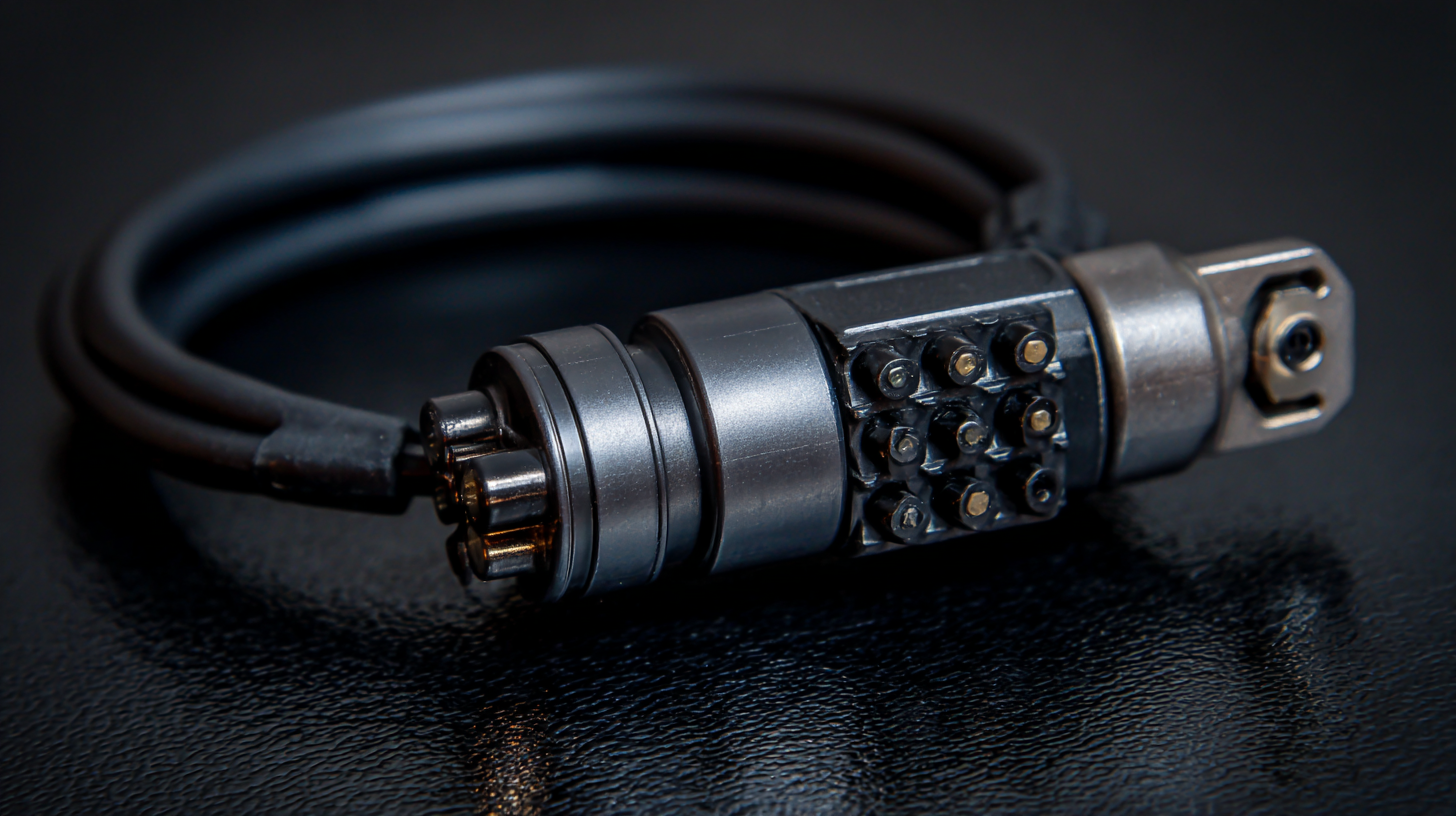
I was reading a report from MarketsandMarkets, and it looks like the global market for automotive connectors might hit around $33.4 billion by 2025, with a yearly growth rate of about 9.3%. As cars get fancier with all those advanced electronics, having reliable, high-performance connectors isn’t just a nice-to-have — it’s a must.
Here at Yueqing Haidie Electric Co., Ltd., we’re all about staying ahead of the curve with innovative wire harness solutions that match these industry trends. We’re dedicated to providing top-notch automotive components that meet the highest quality standards. Our commitment to excellence has really helped us stand out in the field, and as we check out the latest developments with Automotive Multi Pin Connectors, we want to emphasize how important they are in making vehicles more reliable and better performing overall.
Understanding the Basics of Alternative Automotive Multi Pin Connectors
You know, alternative multi-pin connectors are really starting to grab attention in the automotive world. They have this awesome potential to boost both performance and reliability in today’s vehicles. If you’re into this stuff—whether you're a manufacturer or just a car enthusiast—getting a good grasp of how these connectors work is pretty important. Basically, these multi-pin connectors act like the nervous system for a car’s electronic components, making sure everything communicates smoothly and gets the power it needs without a hitch.
What’s pretty cool is that these connectors are built tough to handle the rough conditions they face on the road. They use strong materials and smart designs that boost their durability and performance. For example, newer sealing tech keeps out moisture, dust, and vibrations—things that are pretty much inevitable in a car environment. Plus, they’re often made with lightweight materials, which helps cut down the overall weight of the vehicle and even gives a nice boost to fuel economy. And with electric and hybrid cars becoming more common, these alternative multi-pin connectors are more important than ever. They play a key role in connecting everything from batteries and charging systems to electric drives—making sure all those complex systems work together seamlessly.
Exploring Alternative Automotive Multi Pin Connectors: Innovations in Connector Technology for Enhanced Performance
| Connector Type | Pin Count | Material | Operating Temperature (°C) | Sealing Rating | Applications |
|---|---|---|---|---|---|
| Circular Connector | 5-50 | Aluminum | -40 to 125 | IP67 | Power, Signal Transmission |
| Rectangular Connector | 10-100 | Plastic | -40 to 105 | IP66 | Data Transmission, High-Power Applications |
| Modular Connector | 6-24 | Copper Alloy | -40 to 150 | IP68 | Sensor, Lighting, Automotive Electronics |
| Push-Pull Connector | 2-16 | Stainless Steel | -20 to 80 | IP65 | Mobile Equipment, Industrial Automation |
Key Innovations Driving Performance in Connector Technology
The automotive world is going through some pretty big changes right now, and a lot of it comes down to improvements in connector technology that really boost performance. You see, innovations in multi-pin connectors—especially the ones used in cars—are being driven by the skyrocketing need for more reliable electrical systems. This is especially true with new tech like electric vehicles (EVs) and self-driving features coming into the picture. According to a report from MarketsandMarkets, the global market for automotive connectors is expected to hit around $20 billion by 2025, growing at about 8% annually since 2020. That growth makes sense when you think about how modern cars pack more electronics than ever before, so they need smaller, more efficient connectors to handle it all.
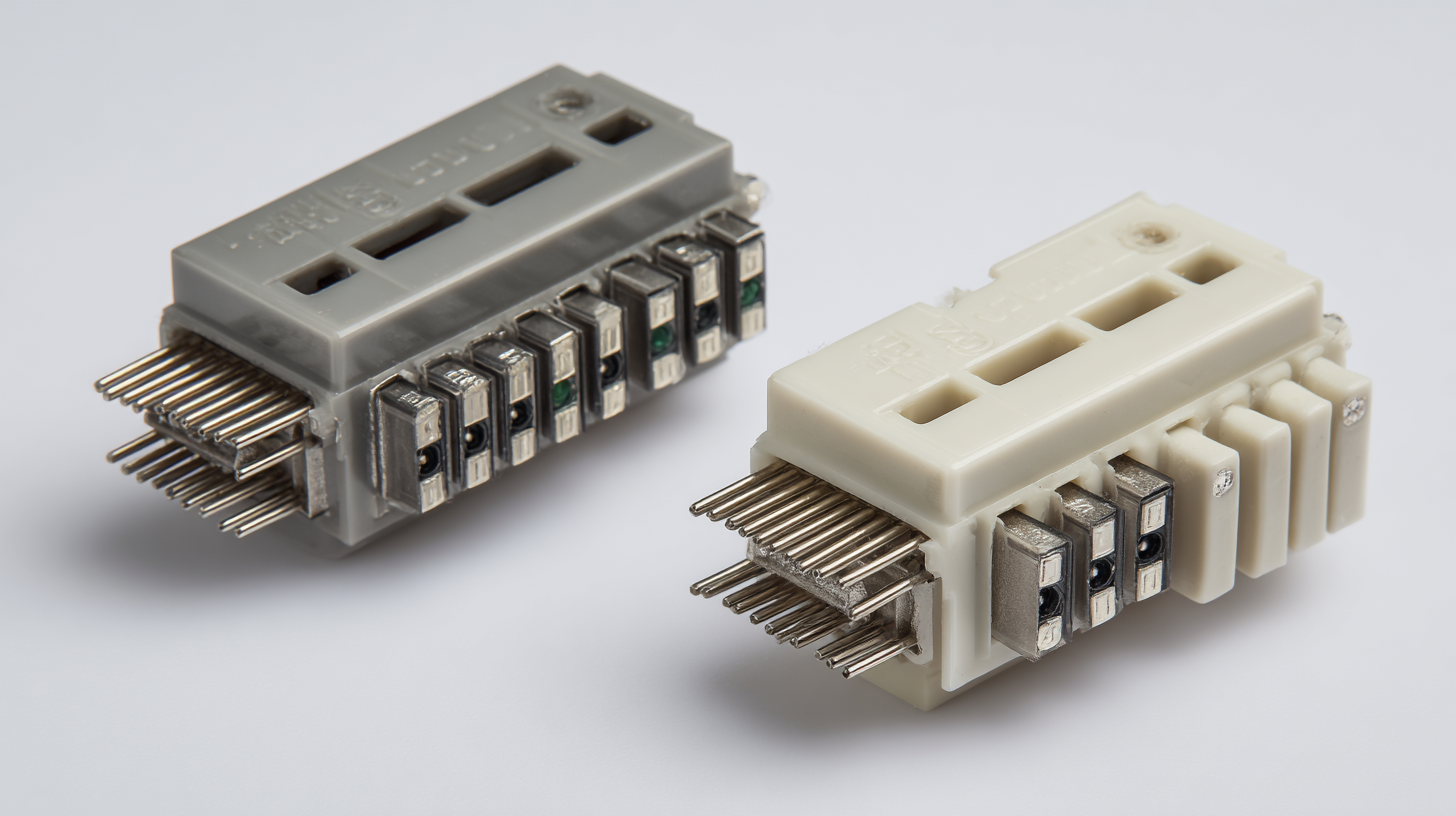
One of the coolest advancements lately is high-speed multi-pin connectors, designed to support things like advanced driver-assistance systems (ADAS). These connectors can transmit data at speeds over 10 Gbps, which means faster communication between different components—lower delay, snappier responses, all that good stuff. Plus, there's a big emphasis on materials that can handle temperature swings and moisture because, as the Society of Automotive Engineers points out, about 30% of electrical system issues in cars are linked to connector failures. So, as automakers keep pushing for tougher, better-performing parts, connector tech is pretty much at the heart of modern car design now.
Comparing Traditional vs. Alternative Multi Pin Connectors
Hey, have you noticed how the automotive world is really shifting lately? One of the big things is these new multi-pin connectors that are coming onto the scene. They’re supposed to perform better and last longer than the older, more traditional types. I read somewhere that, according to Mordor Intelligence, the global market for these connectors is actually expected to grow by about 6.2% each year. A lot of that growth is thanks to the innovations in connector tech itself—makes sense, right? Especially with vehicles packing in all these new electronic systems, you want connections that are both reliable and efficient.
Now, if you’re familiar with the old-school connectors, you’ve probably noticed they’re often metal, which can be a pain because they tend to corrode over time and can be a hassle to install or keep up with. That’s where these alternative options come into play—materials like polymer composites and brand-new sealing techniques. They’re way better at shrugging off environmental damage, which means less maintenance and a longer lifespan for your components. There was even a study from Smithers Pira showing that these fancy connectors can cut down failure rates by up to 30%. That’s a pretty big deal if you’re looking to keep vehicles running smoothly without constant repairs.
A few tips if you’re picking out connectors for cars: think about the conditions they’ll be exposed to. For example, sealed connectors are a smart move—they keep moisture and dirt out, pretty much essential. Also, don’t forget to check that the connectors meet EMI standards so they don’t mess with your car’s electronic systems. And hey, staying up-to-date with the latest industry reports is actually a good idea—they’ll help you catch on to the newest advancements in connector tech before everyone else does.
The Role of Materials and Design in Enhancing Connector Efficiency
You know, in the fast-changing world of cars, the efficiency of multi-pin connectors really matters big time. It's not just about making things work but making them work better and more reliably in today's vehicles. The materials chosen for these connectors are a huge deal—think of them as the backbone that decides how well everything performs.
For example, a report from the Society of Automotive Engineers (SAE) mentioned that using high-performance alloys and thermoplastics can cut down weight while boosting conductivity. That’s a win because it helps keep signals clear and handles heat better. Plus, with modern cars relying so much on electronic systems—like those fancy driver-assist tech and electric engines—these improvements are more important than ever.
If you’re looking to make connectors work even better, a good tip is to go for materials that resist corrosion and can handle temperature swings without fuss. Also, designing connectors that are quick and easy to snap together can save time and keep the whole vehicle running smoothly. Things like overmolding or switching to modular designs can really toughen things up and make maintenance less of a hassle—something that’s definitely needed as automotive tech keeps evolving.
At the end of the day, focusing on innovative materials and smart design choices isn’t just about better performance. It’s also about moving towards more eco-friendly cars. The industry’s aiming to cut connector weights by a quarter come 2025—that’s a big goal, but with the right approach, totally achievable.
Future Trends in Automotive Connector Technology
You know, the automotive world is really going through some big changes right now. And a lot of it revolves around connector tech, which is honestly a game-changer when it comes to improving how our vehicles perform and how reliable they are. As cars get more electrified and packed with advanced electronics, there's never been a greater need for tough, multi-pin connectors that can handle higher data speeds and bigger power demands. Thanks to new materials and smarter designs, these connectors are getting lighter but still tough enough to deal with tough environments — making sure they last and keep performing without a hitch.
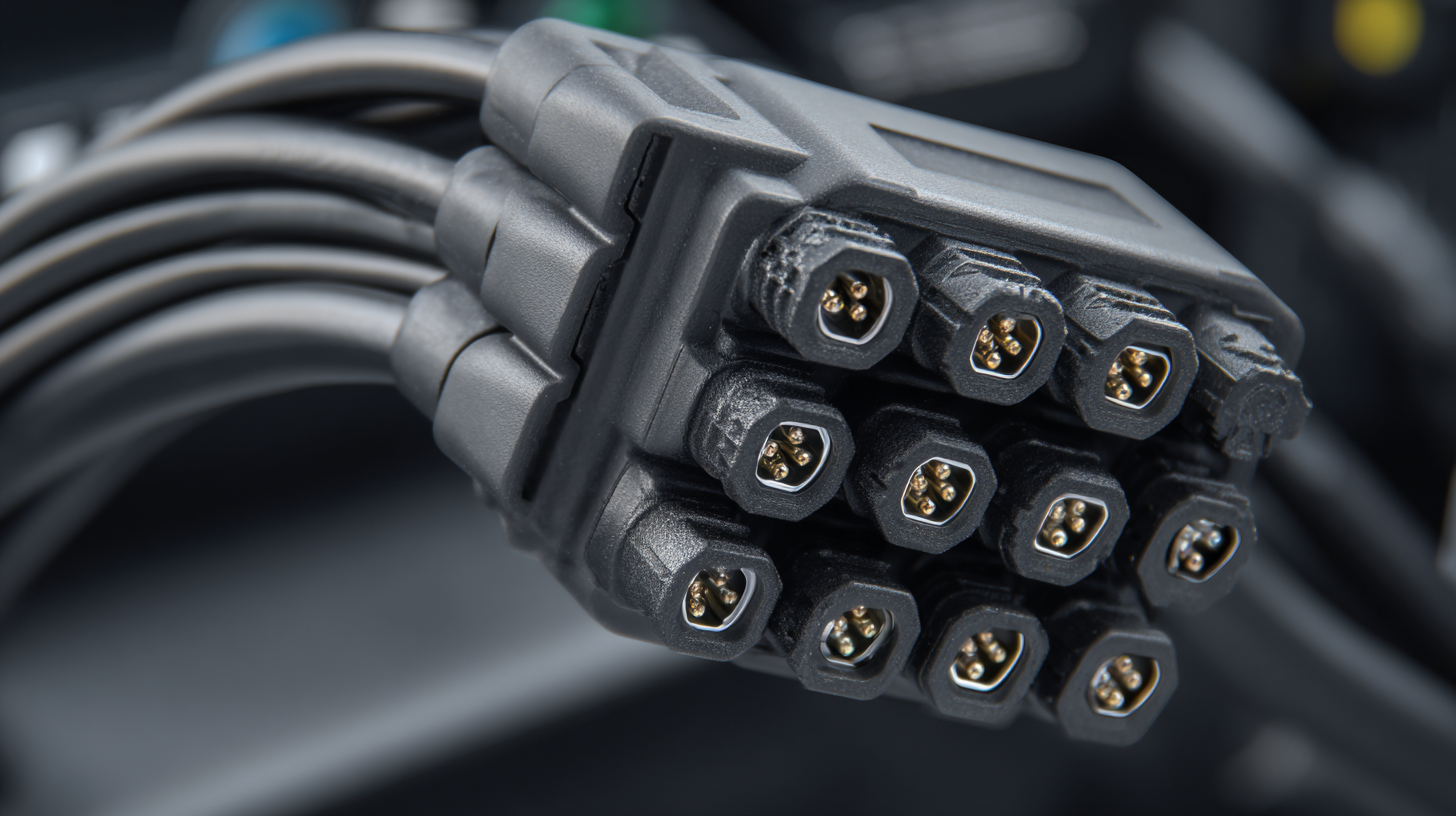 Looking ahead, it seems like we'll see a lot more miniaturized and modular connectors. This makes sense because modern cars — especially electric vehicles and self-driving cars — are way more complex than ever before. Manufacturers are trying to save space everywhere, so multi-purpose connectors that can do everything — power, data, signals — are really becoming the norm. Plus, there's some exciting stuff happening with smart connectors, those that can run self-checks and relay performance info. This will make vehicle maintenance easier and help improve overall safety and intelligence in cars — pretty cool, right?
Looking ahead, it seems like we'll see a lot more miniaturized and modular connectors. This makes sense because modern cars — especially electric vehicles and self-driving cars — are way more complex than ever before. Manufacturers are trying to save space everywhere, so multi-purpose connectors that can do everything — power, data, signals — are really becoming the norm. Plus, there's some exciting stuff happening with smart connectors, those that can run self-checks and relay performance info. This will make vehicle maintenance easier and help improve overall safety and intelligence in cars — pretty cool, right?
Practical Tips for Choosing the Right Multi Pin Connector for Your Needs
When you're looking to pick the right multi-pin connector for your car project, there are a few key things you definitely want to keep in mind. First off, think about where and how it’ll be used. If the connector’s gonna be exposed to moisture, vibrations, or extreme temperatures, you really should go for one that’s rated for weather resistance and durability. Picking a connector with good sealing and tough materials can make a huge difference—trust me, it’ll last way longer and keep things running smoothly even under tough conditions.
Next up, you want to consider the actual configuration. Multi-pin connectors come in all sorts of pin counts and arrangements, so choosing the right setup is pretty important for proper signal flow and avoiding interference. Also, don’t forget to check the electrical ratings—make sure the voltage and current specs match what your system needs. And hey, think about how easy it is to install and maintain. Connectors that snap in easily and can be taken apart without too much hassle are a real lifesaver when it’s time for repair or upgrades. All in all, taking the time to think through these factors will help you pick something that fits your needs, performs like a champ, and won’t give you headaches down the road.
FAQS
: Alternative multi-pin connectors offer enhanced performance and durability, resistance to corrosion, lower maintenance costs, and longer lifespan compared to traditional metal connectors.
The global automotive connectors market is expected to grow by 6.2% annually, driven by innovations in connector technology and the increasing integration of advanced electronic systems in vehicles.
High-performance alloys and thermoplastics are recommended as they can reduce weight, improve conductivity, signal integrity, and thermal stability.
Consider environmental conditions, opt for sealed connectors to protect against moisture and dirt, and ensure connectors meet electromagnetic compatibility (EMC) standards.
Designs that facilitate quick and easy assembly can reduce downtime, and innovative strategies like overmolding or modular designs enhance durability and streamline maintenance.
The automotive industry aims to achieve a 25% reduction in the weight of connector systems by 2025.
Trends include miniaturization and modular designs, multi-functional connectors combining various capabilities, and advancements in smart connector technology for self-diagnosis and performance communication.
As vehicles become more electrified and integrated with advanced electronics, there is a greater demand for connectors that can handle increased data transmission speeds and power requirements.
Innovations in materials enhance connector performance and support the transition towards more sustainable automotive solutions, which is increasingly important in the context of modern vehicle design.
Research indicates that advanced connectors can reduce failure rates by up to 30%, thereby improving overall vehicle reliability and functionality.
Conclusion
So, the blog titled "Exploring Alternative Automotive Multi-Pin Connectors: Innovations in Connector Technology for Better Performance" really dives into what makes these connectors tick. It kicks things off with an overview of different types of alternative connectors, then shifts gears to highlight some pretty cool innovations that boost efficiency — you know, what really sets them apart from the usual traditional designs. It also takes a closer look at how materials and design choices play a crucial role in making these connectors more functional and reliable.
As the auto industry keeps moving forward, the blog even touches on upcoming trends in connector tech, giving us a sneak peek at what might be coming down the road. To wrap things up, there are some handy tips for picking the right automotive multi-pin connectors—stuff that can really help you make smarter decisions tailored to your needs. We've drawn on our experience here at Yueqing Haidie Electric Co., Ltd., to highlight the importance of high-quality wire harness solutions that meet customer demands. After all, trustworthy connectors are super vital in today’s modern vehicles!
Overall, it’s a pretty solid read if you’re into automotive tech and want to stay updated on what's new and improved in connector technology.
Related Posts
-

2025 Automotive Connector Trends: An In-Depth Comparison of the Best Connectors in Car Technology
-

Benefits of Choosing the Best Car Pigtail for Enhanced Vehicle Performance
-
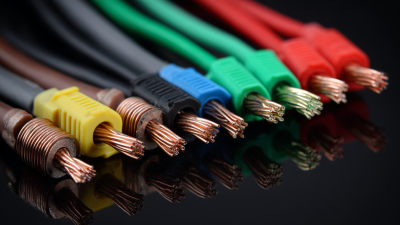
Ultimate Guide to Choosing the Best Wire Harness Connectors and Terminals for Optimal Performance
-
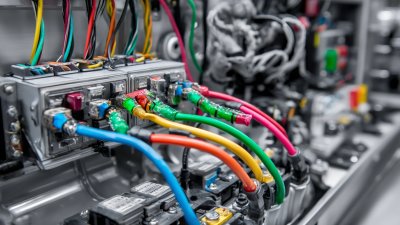
7 Essential Tips for Choosing the Best Auto Wiring Harness: Optimize Your Production with 30% Less Downtime
-
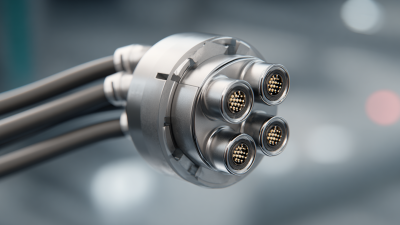
The Future of Innovation in Harness Connectors for Smart Technology
-

Comprehensive Guide to Best Wire Connecters with Technical Specifications and Installation Tips
Blog Tags:

